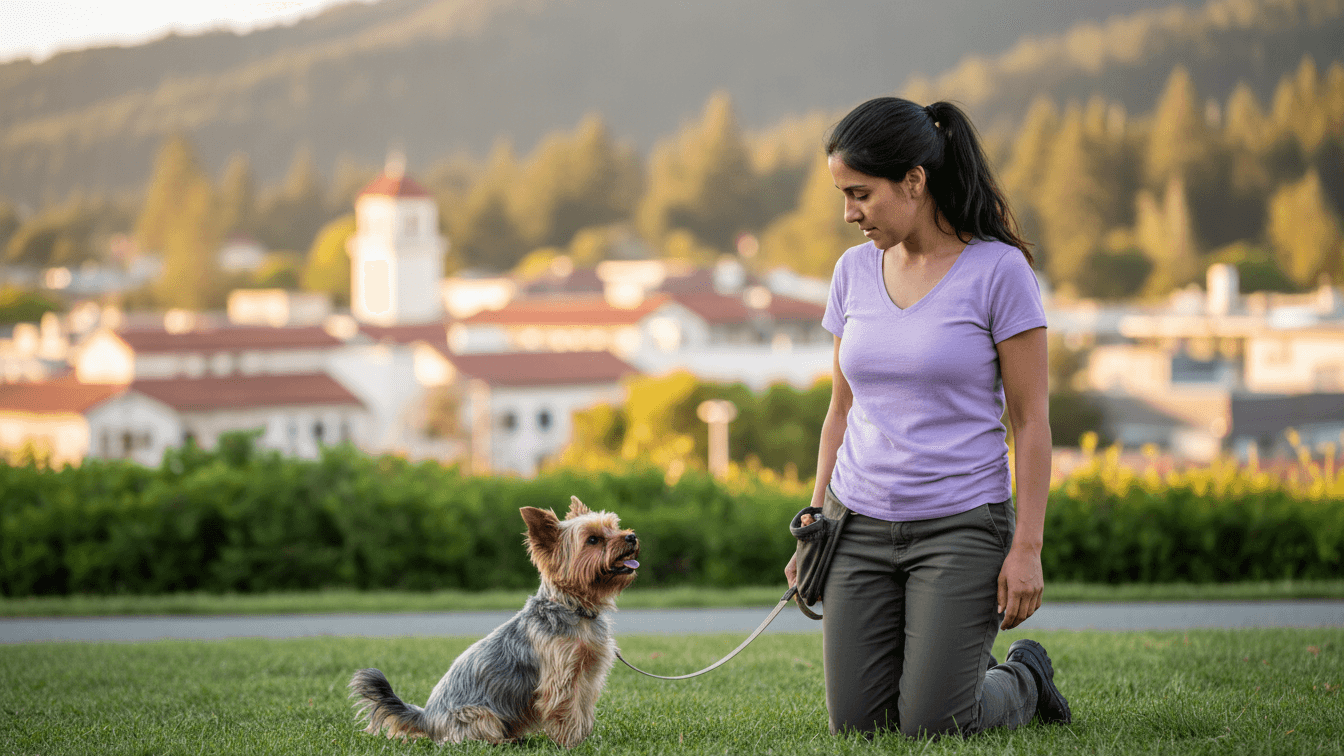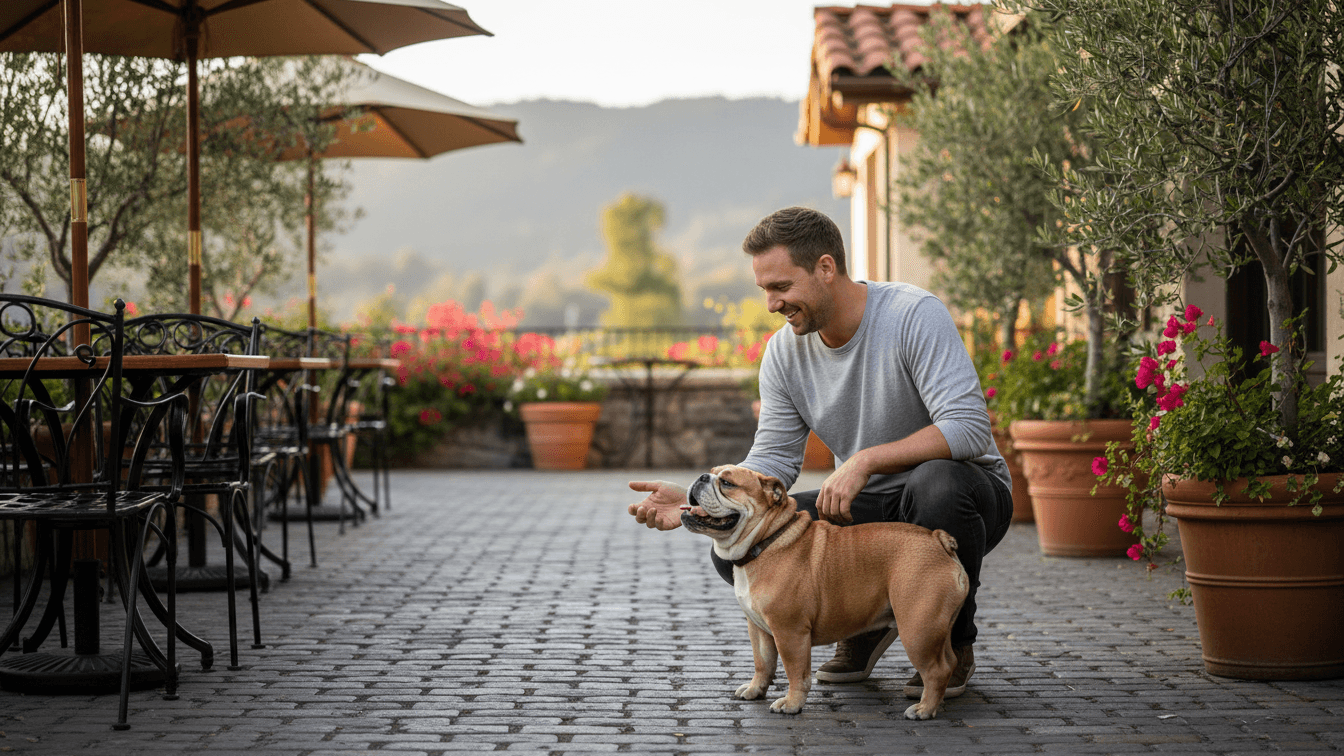Your Complete Guide to Choosing a Dog Trainer in Mill Valley and Surrounding Areas
Living with a dog in Mill Valley means navigating steep hillside trails, sharing narrow sidewalks with cyclists and hikers, and keeping your dog calm when you stop by local shops along Throckmorton Avenue. Your dog needs to handle all of this with confidence, from loose-leash walks through Bayfront Park to staying polite when you pause at outdoor cafes near downtown.
Since Mill Valley sits in Marin County, local rules follow both town ordinances and county regulations. When you find a professional dog trainer who understands these mountain-town specifics, you’ll get better results both at home and out on the trails.
How to Choose the Right Trainer
Start by looking for someone who uses positive reinforcement training and understands the unique challenges of living in a compact, hilly community. This means your dog should learn to walk calmly past mountain bikers on fire roads, stay focused near wildlife on wooded paths, and handle crowded weekends at Depot Plaza without reactivity.
Credentials give you a quick way to compare trainers’ experience levels. Common dog trainer certifications include KPA-CTP, CPDT-KA, or IAABC-CDBC for behavior problems. If your dog has serious aggression issues, look for someone with CBCC-KA or a science-based program like CTC.
In-home dog training works great for door manners, preventing bolting down steep driveways, and teaching calm behavior when delivery drivers arrive. Group classes make sense once your dog can focus around other dogs, especially before you try busy spots like the Mill Valley Community Center or weekend farmers markets.
Common Dog Training Methods Explained

Reward-based methods build the trust you want while creating lasting behavior changes. They also help you follow Marin County’s rules about keeping dogs under control in public spaces.
Basic obedience covers sit, down, stay, place, recall, and leash training so your dog can handle steep trails, busy sidewalks, and patio dining without pulling or jumping on strangers.
Puppy training focuses on socialization, potty training, bite control, crate comfort, and early leash skills. Starting with short, positive training sessions prevents bad habits from forming, especially important when raising a puppy in a home with stairs and hillside yard challenges.
Behavior modification addresses fear, reactivity, resource guarding, or separation anxiety through careful desensitization and counterconditioning. For serious cases, ask if your trainer works with local veterinarians in Mill Valley or nearby Sausalito.
Private lessons and in-home sessions let you customize everything around your daily routines, including practicing on your actual neighborhood hills and staircases. Day training can speed up results when you’re short on time or juggling work commutes to San Francisco.
Dog training classes help your dog practice good manners around other dogs and people. The best classes give dogs plenty of space, screen participants carefully, and teach calm behavior rather than just excitement.
Specialized training like therapy dog training or service dog training requires extra structure, public-access skills, and a very clear step-by-step training program.
Stay away from trainers who use fear, intimidation, or pain to get results. Humane methods are safer for everyone, easier to maintain long-term, and much better for keeping peace with your neighbors in this close-knit community.
Average Cost of Dog Training in Mill Valley CA and Surrounding Areas (Updated for 2025)
Prices around Mill Valley and Marin County tend to run higher than many California regions, reflecting the area’s cost of living and the expertise required for mountain-town training challenges. Here’s what most local pet owners are paying in 2025.
| Service Type | Average Cost (Mill Valley/Marin County) |
|---|---|
| Puppy classes (4-6 weeks) | $200-$325 total |
| Group obedience classes (4-6 weeks) | $225-$375 total |
| Private lessons (60-90 min) | $150-$250 per session |
| In-home coaching packages (4-6 visits) | $600-$1,200 total |
| Day training (trainer works your dog + handoff) | $600-$1,200 per week |
| Behavior consult for reactivity/anxiety (initial) | $200-$325 |
| Board and train (2-4 weeks) | $3,000-$6,000 total |
You’ll probably pay extra travel fees if your trainer is coming from outside Mill Valley, and expect higher rates for complex behavior work involving aggression or severe anxiety.
Make sure you understand what’s included in each training program, how the trainer tracks progress, and whether they offer a free consultation or free evaluation before you commit to a package.
Questions to Ask a Potential Dog Trainer
- What training methods do you use, and how do you keep training sessions positive and low-stress?
- What credentials do you have, like CPDT-KSA or KPA-CTP? Do you keep up with continuing education?
- How will you customize the training plan for my dog’s specific needs and our Mill Valley lifestyle, including steep terrain and wildlife encounters?
- Do you offer in-home visits, group classes, or day training, and which approach fits my goals best?
- How will we measure my dog’s progress and know when to add more distractions like bikes, hikers, and deer?
- What are the total costs, including any travel fees, and what’s your cancellation policy?
- Do you carry liability insurance, and can you show me proof?
- For behavior problems, will you work with my veterinarian if needed?
- What should I practice between our sessions to help my dog keep improving on trails and around town?
Local Mill Valley Rules and Considerations
Mill Valley enforces leash laws and nuisance rules to keep parks and trails safe for everyone. Marin County follows California’s public health requirements too.
Leashes are required in all public spaces except inside designated off-leash dog parks or clearly marked voice-control areas. Keep a standard 6-foot leash with you for downtown sidewalks, Bayfront Park, and most fire roads.
California law requires current rabies vaccination for all dogs over four months old. You can get these through county clinics or your regular vet, and find more details through Marin County Animal Services.
Excessive barking can be considered a nuisance, so work with expert dog trainers on alert barking and separation anxiety before neighbors start complaining. This is especially important in Mill Valley’s hillside neighborhoods where sound travels.
California doesn’t require special licenses for dog trainers, but if a business boards dogs for payment, the state’s Animal Care Program oversees kennel licensing through the California Department of Food and Agriculture.
Marin County Animal Services provides information on lost pets, microchips, spay-neuter resources, and licensing requirements on their website.
Local Mill Valley Resources for Dog Owners
These spots give you great places to practice polite manners, work on recalls, and provide safe enrichment for your dog. Always follow the posted rules and etiquette guidelines.
- Bayfront Park Dog Park offers fenced areas where dogs can practice off-leash recalls and calm greetings. Visit during quieter weekday mornings when you’re starting out.
- Mount Tamalpais State Park allows leashed dogs on fire roads and some trails, perfect for building focus around hikers, cyclists, and wildlife. Check posted signs carefully as some trails prohibit dogs.
- Old Mill Park welcomes leashed dogs and provides open grassy areas for practicing basic obedience while building distraction tolerance around families and picnickers.

FAQs
How much does in-home dog training cost?
Most Mill Valley trainers charge $150-$250 per in-home visit, with discounts available when you buy packages. Behavior problems involving reactivity or aggression typically start at the higher end of that range.
Is in-home dog training worth it?
Absolutely, because you’re working on problems exactly where they happen. Your trainer can fix door manners on steep entryways, teach your dog to navigate stairs safely, address yard reactivity to passing hikers, and practice leash skills on your actual neighborhood hills.
Can you pay someone to house train your dog?
Yes, many trainers offer puppy training programs that include potty training, crate routines, and daily schedules. Day training can speed up the process while teaching you how to maintain the progress.
What is the 3-3-3 rule for dog training?
This is a helpful timeline for new or adopted dogs: expect about 3 days for your dog to decompress, 3 weeks to learn your routines, and 3 months to feel completely settled. Good training programs work with this natural adjustment period.
How long will it take to reach my training goals?
Most puppies and friendly adult dogs show solid progress within 4-8 weeks if you practice daily. Fear, reactivity to wildlife or bikes, or aggression typically requires several months of careful behavior modification with gradual increases in difficulty.
What should I bring to group classes?
Pack a flat collar or harness, a 6-foot leash, high-value treats, water, and current vaccination records if your trainer requests them. Leave retractable leashes at home for safety reasons.
What’s the leash law in Mill Valley?
Dogs must be leashed and under control in all public areas except inside designated off-leash dog parks or posted voice-control zones. Keep that 6-foot leash handy for downtown, neighborhood sidewalks, and most trails.
Do I need a dog license in Mill Valley or Marin County?
Yes, Marin County requires all dogs over four months old to be licensed annually. You’ll need proof of current rabies vaccination to get a license through Marin County Animal Services.
What shots does my dog need in Marin County or California?
Rabies vaccination is required throughout California for dogs over four months old. Your veterinarian may also recommend distemper-parvo, bordetella, and leptospirosis based on your dog’s lifestyle and exposure to wildlife or other dogs.
Are dog trainers required to be licensed in Mill Valley or Marin County or California?
No special trainer licenses exist in California. Trainers follow normal business regulations, but if they offer board and train services, their facility may need to be licensed as a boarding kennel under the state’s Animal Care Program regulations.
Where can I practice off-leash recall?
Use the fenced dog park at Bayfront Park to keep things safe and legal. For voice-control practice in less contained areas, check Mount Tamalpais State Park for any posted off-leash zones, though most areas require leashes.
Which dog parks allow training around Mill Valley and surrounding areas?
Bayfront Park Dog Park in Mill Valley allows off-leash play within its fenced areas. Nearby options include Marinwood Dog Park in San Rafael and Field of Dogs at Golden Gate Park in San Francisco, both offering fenced spaces for recall practice.
What beaches or trails allow dogs for training?
Muir Beach allows leashed dogs on the beach and adjacent trails, perfect for practicing calm behavior around water, birds, and other beachgoers. Mount Tamalpais State Park fire roads welcome leashed dogs and provide excellent opportunities to help your dog build focus around hikers, mountain bikers, and deer. Tennessee Valley Trail allows leashed dogs and ends at a beach where dogs can explore tide pools under supervision.
How do I handle my dog around wildlife in Mill Valley?
Work with a certified dog trainer on solid recall and “leave it” commands before encountering deer, raccoons, or coyotes on trails. Practice impulse control at home first, then gradually add wildlife distractions during quieter trail times. Keep your dog leashed until their recall is rock-solid, as wildlife encounters can trigger even well-behaved dogs.
Can my dog join me at outdoor restaurants in Mill Valley?
Many Mill Valley cafes and restaurants with outdoor patios welcome well-behaved dogs. Practice calm settling on a mat or place command at home first, then work up to short visits during less busy times. Bring water for your dog and always ask staff permission before bringing your dog into patio areas.
The right combination of thoughtful planning, humane dog training services, and consistent practice around Mill Valley’s trails and neighborhoods will help your dog become a confident, well-behaved companion. If credentials matter to you, don’t hesitate to ask about dog trainer certifications and how your trainer stays current with new techniques.
